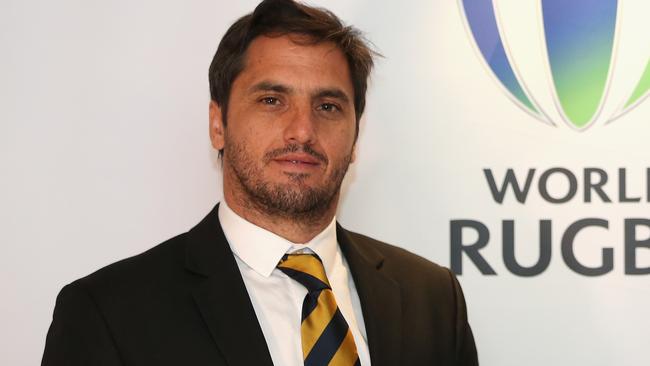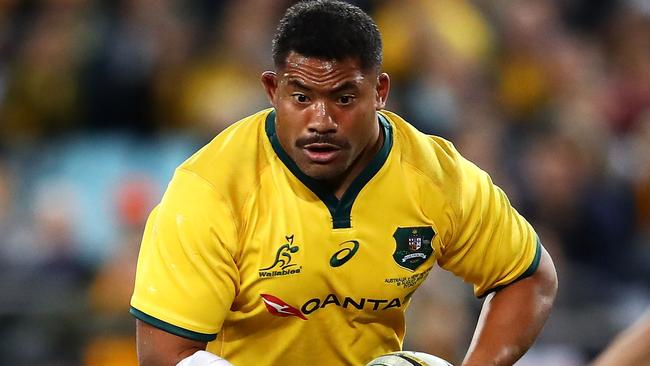Rugby union dying internationally as northern hemisphere takes over
International rugby is a disaster movie and time is running out. And the villains in the piece are predators from the north.
By my count, we now have 352 days to save the game. International rugby is a disaster movie, time is running out.
Just occasionally, I concede, the media may be guilty of overhyping a story but at present we have no need to because it is being done for us by Agustin Pichot, the vice-chairman of World Rugby. Thirteen days ago Pichot declared that we had 12 months to rescue international rugby from the financial abyss. And because the former Argentina scrum half is a rebel who wears white trainers with his suit and administers the game with the kind of panache that he showed when he played it, we all sit up and listen. Tick tock. We are all doomed. Oh hell.
Pichot was referring to the reorganisation of the global calendar, which was agreed in San Francisco 20 months ago. That was a significant event which would dictate the future of the professional game around the world. “We thought we had a fix,” Pichot said 13 days ago. Now, apparently, the opposite is the case. There is a World Rugby council meeting in Sydney this week; let’s start saving the world there.
All this came as a bolt from the blue. As you would expect, since San Francisco, the different unions around the world have been operating on the assumption that the agreements made there were genuine agreements. The RFU, for instance, is only two or three weeks away from the public announcement of the whole blueprint for the future of the domestic and international game in England. This has been a huge piece of work. Is it to be ripped up now?
No, no, said Bill Beaumont, the chairman of World Rugby - he is No 1 where Pichot is No 2 - though he would not say so publicly. He did so in a letter to the RFU in which he contradicted Pichot’s statements by saying that San Francisco stands.
Apparently he and Pichot are not on the same page because yesterday Midi Olympique, the French newspaper, set out even more specifically Pichot’s plans for rearranging the international calendar complete with a 12-nation tournament in November to replace the traditional autumn tours.

Some people believe that Pichot is running one long campaign to take Beaumont’s job, others say that he is the only one who really cares. Certainly he sounds as though he cares but when he identifies the European clubs as a big problem in the world game and then says, “Why don’t we speak to them? Why don’t we get together?” it would help if he then followed that with a phone call. No, they have not been invited to join the Sydney summit.
And yet Pichot talks so much sense. There is no doubt that the clubs in England and France, in particular, are destabilising the world game. World Cups are always watersheds and, almost daily, the French press bubbles along with rumours of the latest All Black superstar who is being tempted by big-money offers to emigrate the minute the World Cup is done.
Ben Smith and Ardie Savea are reportedly being chased by Pau. Likewise Racing 92 and Toulon want Ryan Crotty, Toulon would also like Sam Whitelock or Brodie Retallick (well, who wouldn’t?), Lyons want Nehe Milner-Skudder and a reported four clubs are lining up bids in the region of 1.5 million euros (about $2.4m) a year for Beauden Barrett.
Lima Sopoaga, the All Black who recently joined Wasps, said two weeks ago that he expected the number of Kiwi defectors to rise post-World Cup. Jaco Kriel, one of the new Springbok arrivals at Gloucester, said that he had come now because after the World Cup the market would be flooded. It just so happens that, at the very time when international rugby is struggling to deliver financially in the southern hemisphere, Premiership Rugby in the north is enjoying a rollicking start to the new season on the pitch and, off it, is considering offers of cash injections in the region of 250 million pounds.

The NZRU is fighting hard to keep its stars at home; recently it made a real statement in confirming that Rieko Ioane had signed for four more years. The hope in New Zealand is that Ioane’s is a lead that others will follow. However, it is indisputable that the direction of travel for rugby finances, and therefore for players, is northwards. Over the coming months, we will see if this is just more than the regular trickle or, as Kriel says, something of a flood.
If nothing else, Pichot’s recent statements have confirmed that San Francisco was a fudge. There were opportunities there for the kind of blue-sky thinking that, 20 months too late, he is now pushing. Rugby’s leaders could have been radical. For instance, like Pichot now, they could have addressed this dated tradition of a group of inconsequential friendlies in November; alternatively, they could have pushed for a quadrennial club championship between the hemispheres’ best; alternatively, they could have protected one of the greatest and most popular cash cows of them all, the British & Irish Lions.
The possibilities were endless. Rip up the status quo and start again. Instead, they emerged with a compromise that seemed, just about, to work for everyone. It was not about leadership and taking the game in a new direction; it was all about consensus and meeting in the middle. Twenty months on, Pichot says that international rugby is on its last legs. It would have helped if he had foreseen the end of the world at the time that they were redesigning its future. It is 20 months too late to redraw the map.
The international game is not dying but it is moving slowly north and nothing, now, is going to stop it.
The Times





